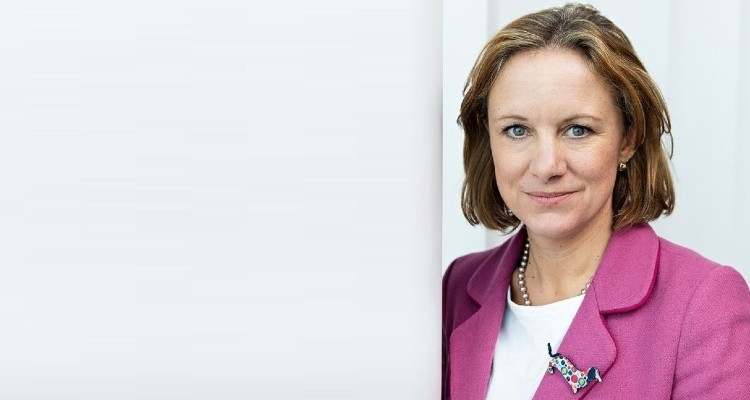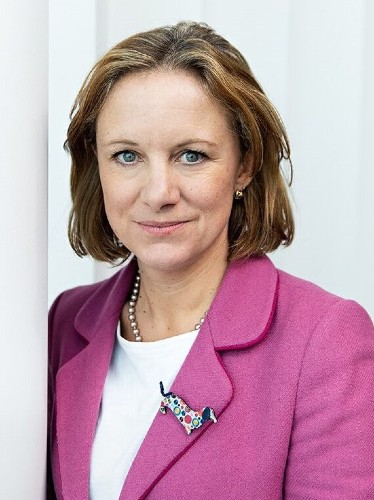Mon 04 Oct 2021

Claire Bassett, deputy director general, operations at Independent Office for Police Conduct tells us about her experience as a woman leader, ahead of her participation at Woman in Policing, the online event on 7 October
By Murielle Gonzalez
Women in policing have grown in numbers over the past few years. As of March 2021, there were 43,762 female police officers in the 43 police forces across England and Wales, making up 32.4% of the staff. But, in a world that values gender balance and inclusion, there's still a way off.
Edith Smith paved the way for women in policing when in December 1915, she began patrolling the streets of Grantham, Lincolnshire, becoming Britain's first female police constable with official powers of arrest.
Women in the force had been employed since the 1800s but appointed to search, supervise and escort women prisoners held at police stations or the courts. Throughout history, women have shown a call for the job with commitment and vocation.
However, government data show that constables have greater female representation than other ranks – just over 30% in 2018. And while female numbers have increased across all ranks over time, there's been a sharp decline at chief superintendent level since 2016. So, what's holding them up?
For Ellen Kirschman, a doctor of clinical psychology who specialises in police and public safety psychology, women make good police. However, there's an underlying reason why we don't have more of them.
Writing for Psychology Today, she explained the profound difference between how men and women define what it means to be a 'cop'.
"In general, women emphasise helping over controlling people. They regard physical prowess, control and command actions, and officer safety as crucial, but they don't seem to value these skills the same way men do," she said in this article.
Kirschman supported the argument with the findings of a 2016 Pew Research survey of nearly 8,000 police officers. The investigation found that one-third of the women agreed that some people can only be brought to reason the 'hard, physical way’ – but almost half of the men had this view.
The ‘cop doc’ believes that rather than the physical rigour of the job, what challenges women in law enforcement is the lingering mythology about what happens on patrol and the price women pay for being competent.
"A woman has to prove she is as good as any male officer, and she has to do this at every rank," she said, noting that "men need only to be as good as each other."
Moreover, Kirschman explains that when a woman shows she can be as aggressive, ambitious, powerful, proud, or tough as a man, she is likely to be seen as "pushy or strident".
So how can women become a leader in policing when these stereotypes challenge them?
The conference Women in Policing takes place next week (7 October), and the agenda has been designed to help delegate answer this question. The online event is also a networking platform for women from all sectors of law enforcement to come together, share experiences, and feel inspired.
Claire Bassett, deputy director general, operations at Independent Office for Police Conduct (IOPC), will be speaking at the event. We caught up with her, and in this interview, she tells us about her experience as a woman leader. Ahead of the event, she offers some actionable advice to help other women progress in their careers.
"I really like the commitment and the passion that you see here," says Bassett, noting the IOPC looks at the police force through a particular lens, often when policing has gone wrong or where people have done things that they shouldn't have done.
"We're aware that the vast majority of police officers do a really difficult job in really difficult circumstances," she adds. "I have enormous respect for the vast majority of police in the work they do."
A good ally

Bassett joined the IOPC in September last year, but this is not her first c-suite role. With a background in law and sociology, she has previously served as chief executive (designate) of the Shadow Trade Remedies Authority and was director of the Trade Remedies Investigations Directorate within the Department for International Trade.
Other high-rank jobs are under her belt. She was chief executive at the Electoral Commission, chief executive with the Parole Board for England and Wales, and chief executive for the Criminal Cases Review Commission (CCRC), to name a few.
“Every day, I apply some of the lessons I learned in my previous roles,” she says, noting her experience has been helpful to manage risk, deal with work volume, scrutiny, and the challenges of the job. “I learned to enjoy and value that. And I see that here at the IOPC as well. So, one of the best things about this job is just bringing those different aspects together.”
How has your path to leadership been?
I've applied for jobs and not got them, so that's happened to all of us. But very early on in my career, I decided to take some risks. I put myself forward for secondments that probably most people thought I was a bit above myself.
I was willing to gain experience and do unpopular jobs, and I think some of that helped me get where I’m today.
Have you ever been challenged for being a woman?
I haven't experienced very much of that. But I vividly remember my first chief executive job. I'm quite informal, so when I have meetings in my office, I go and meet my guests at the door.
On this occasion, I hadn't met him before, and he didn't realise who I was. He just handed me his coat and asked for coffee. Of course, he didn't get coffee. That memory sticks with me about just how humiliating that was.
Is there a trait that you think is key to women leaders?
I don't think there is one trait that anyone successful has. If you look around leaders, they can have such different personalities and different ways of doing it. What it's interesting in the last few years is the growing recognition that you can be a quiet leader.
I'm a big personality by nature. I lead from the front, and people know when I'm in the room. But I think it's exciting that people are talking more and more about how people are quiet leaders – and that's my development path.
We are increasingly valuing very different types of leadership, and that can only be good news for women.
What's your view on mentorship?
I'm a massive fan of mentorships and usually have two or three people mentoring at one time or another. I get so much back from talking with people and listening to their stories and listening to them.
I'm keen on social mobility, and I think that as somebody who had a good start in life, good education and parents who supported that, it's really important that I help others who haven't.
As a leader and a woman, I need to give other women an opportunity to be heard. And one of the things that I'm particularly keen on is being a good ally. I'm in a position of authority, and I can use that.
How has mentoring helped you?
It's important that, as a leader, I can have a diverse team. I want people who think differently, and I want people who bring different lived experiences to the team because that's what makes a good team, particularly when you're delivering tough social agendas.
And if I'm going to get that, I need women from different backgrounds to succeed. Sometimes they are going to need a bit of help and support, and that’s a really easy thing that someone like me can give back.
What is your advice for women seeking a leadership role?
You've got to be authentic because so much is needed of you. If you're going to lead people, you're going to make difficult decisions, and you're going to provide strategic leadership, so you must be as resilient and strong as you can be.
And you have to be kind to yourself – and this was a lesson I had to learn. I am my worst critic, and often it's not good enough for me. But I've realised that you don't have to be at your finest hour all the time. You need to forgive yourself and move on.
The conversation with Claire Bassett closes with one bit of advice that her auntie Marjorie gave her. "She was my Granny's best friend and lived to 103 years. She had a rocking life, and the advice she gave me was ‘don't have regrets, have experience’. And I think that's pretty good," she concludes.
Women in Policing takes place on 7 October. This online event offers practical advice and coaching on how to further develop your career in times of change.
Visit the event website, explore the agenda, and book your place today.
ABOUT THE AUTHOR
Murielle Gonzalez, content strategy manager at Dods Diversity & Inclusion, is an experienced journalist and editor. She can be reached on murielle.gonzalez@dodsgroup.com.
View all news